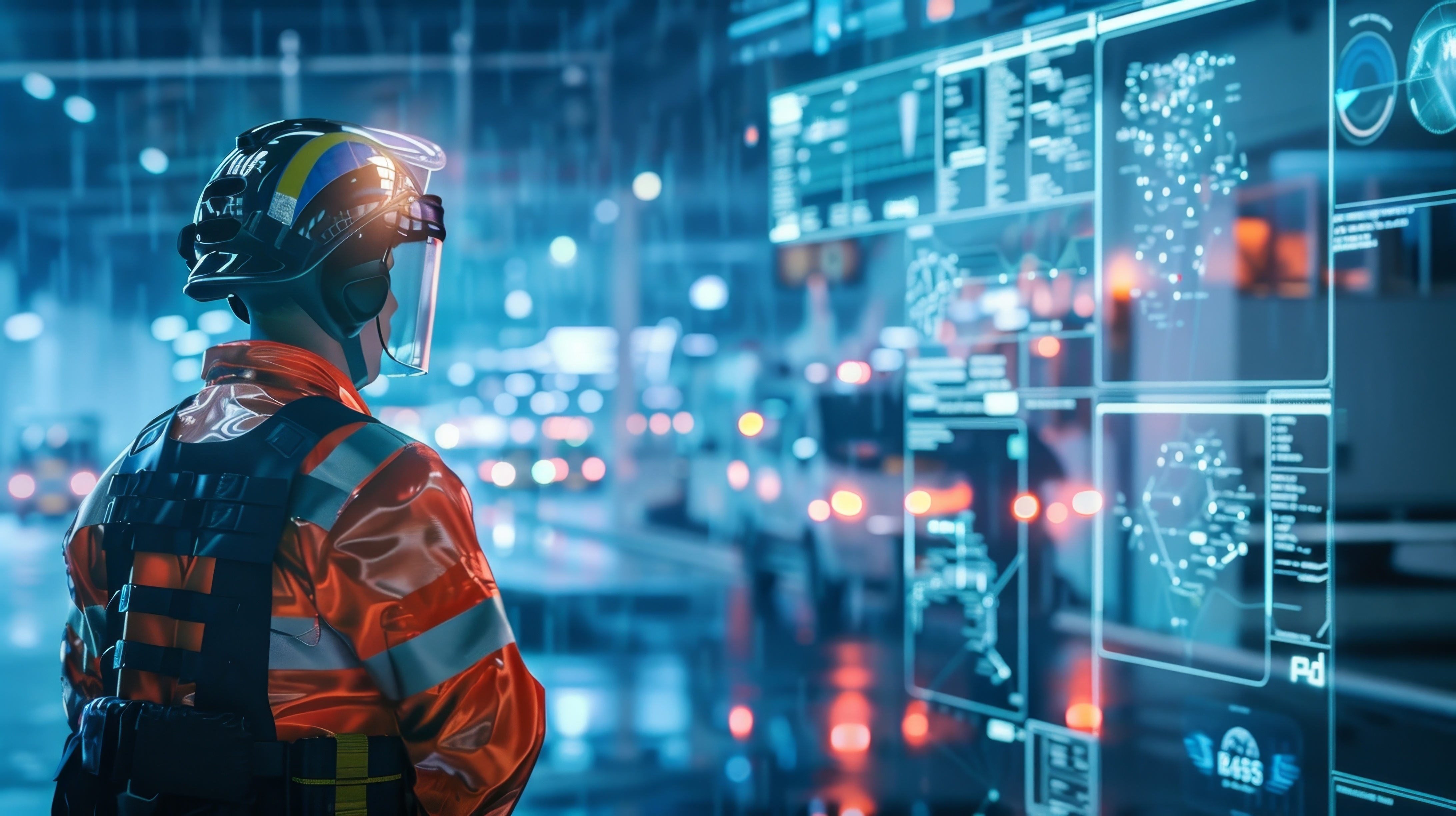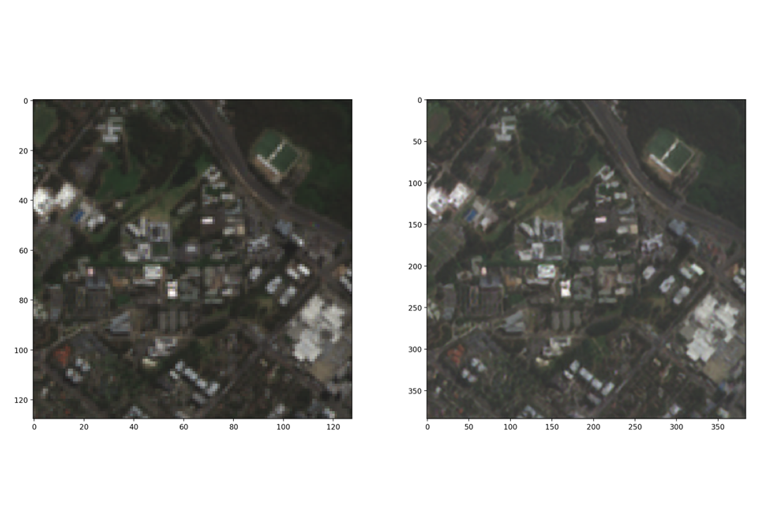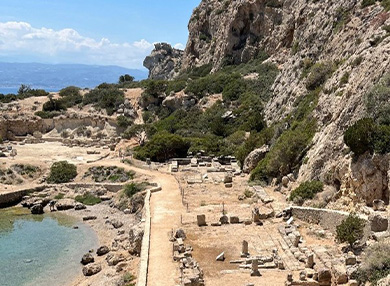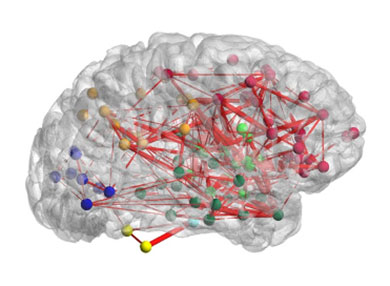Current Data Horizons research projects
Our projects harness the exponential growth in data volume, variety and velocity to transform data-driven discovery and solutions to complex problems. Learn about the following projects our researchers are currently working on.
Projects funded in 2025
Multiple system atrophy (MSA) is a rapidly progressive neurodegenerative disorder that is challenging to diagnose early. Distinct movement abnormalities in the larynx may serve as specific biomarkers distinguishing MSA from other neurological conditions with a similar initial clinical presentation. This project aims to automate the analysis of laryngoscopic videos using a deep learning tool that tracks anatomical features across time (Figure). By applying unsupervised machine learning to extracted movement data, we seek to identify subtle, disease-specific patterns that may distinguish MSA patients. This approach promises faster, objective, and scalable analysis, potentially enabling earlier diagnosis and broader clinical adoption, and will be integrated into our international multicentre study.

Project team: A/Prof Florin Gandor; Dr Bowen Dempsey; Prof Hanlin Shang; Prof Simon McMullan
The legal industry remains largely service-oriented, where professional expertise is captured in fragmented formats such as file notes, emails, and legal opinions—rarely structured or preserved as a reusable, tradeable asset. When senior lawyers retire, law firms often face substantial loss of institutional knowledge and decision-making acumen, negatively impacting valuation and operational continuity.
This project aims to address this gap by developing LLM-based digital legal personas—AI agents that embody domain-specific expertise and reasoning patterns of experienced lawyers. Through a collaboration between machine learning experts (Dr Yuankai Qi (Lead CI), A/Prof Jia Wu, Prof Jian Yang, Prof Amin Beheshti) and law experts (Dr Daniela Simone and A/Prof Rita Matulionyte), this project combines frontier data science with deep legal knowledge.
Research team: Dr. Yuankai Qi; Dr Daniela Simone; A/Prof. Jia Wu; A/Prof. Rita Matulionyte; Prof. Amin Beheshti; Prof. Jian Yang
The Australian Media Landscape Monitor (AMLM) revitalizes the defunct ANDP to map newsroom changes across Australia. Integrating media, demographic, political, and economic data, AMLM offers an interactive tool for researchers, journalists, and policymakers to track ownership trends, news deserts, and community impacts—advancing media diversity and democratic resilience.

Research team: Dr Mathias Felipe de Lima Santos; Prof Peter Greste
Connecting applied linguistics and data science, this project develops a custom AI chatbot to support students in English Language Intensive Courses for Overseas Students (ELICOS) in practising real-world communication through text- and voice-based AI interaction. It aims to provide scalable, pedagogically grounded strategies for integrating conversational AI into language programs.
Research team: Dr Yeong-Ju Lee; A/Prof Michael Proctor; Prof Mark Dras; Prof Peter Rogers; Dr Vanessa Enríquez
AlignCare aims to make AI systems in healthcare more inclusive, ethical, and responsive to the diverse cultural, religious, and personal values that influence health decisions. While large language models (LLMs) are increasingly used in clinical communication and decision-making, they often fail to capture the full range of patient perspectives, leading to advice that may be biased or culturally insensitive. This project addresses that gap by developing methods for pluralistic alignment—ensuring AI systems recognise and respect diverse beliefs. Key outcomes include innovative approaches for inclusive AI, open-source tools, evaluation methods to assess AI’s respect for diverse values, and insights into overcoming AI’s limitations in healthcare. These advances will enhance AI performance across varied health scenarios, reduce bias, and improve satisfaction for both patients and providers.
Project team: Dr Usman Naseem; Dr Sidong Liu; Prof Mark Dras; Prof Olivera Marjanovic; Prof Jian Yang
Projects funded in 2024

Our project aims to enhance disaster response simulations using advanced graph-based algorithms and machine learning. Led by CIs Dr. Shan (Emma) Xue, Prof. Amin Beheshti, Prof. Mohsen Asadnia, A/Prof Jia Wu, and GRA students Ms. Qihua Lyu and Mr. Yifei Han, the project focuses on improving the scalability, flexibility, and adaptability of simulated agents to better coordinate rescue teams in post-earthquake scenarios. Key outcomes include robust pathfinding algorithms, an adaptive learning framework for agents, enhanced communication models, and a user-friendly interface for simulation control and data analysis, contributing to more effective real-world disaster response strategies. These advancements will enable more efficient coordination and resource allocation in disaster situations, ultimately improving the effectiveness of emergency response efforts.
Research team: Dr Shan (Emma) Xue; Prof Amin Beheshti; Prof Mohsen Asadnia; A/Prof Jia Wu; Ms Qihua Lyu; Mr Yifei Han
Detecting greenwashing is crucial for tackling the global surge in climate-washing litigation. This project brings together a multidisciplinary team to develop an AI-driven system by leveraging advanced techniques and technologies in data analytics. The expected outcomes will help stakeholders manage and pre-empt potential legal challenges.
Research team: Ken Siu, Shawkat Alam; Mingze Gao; Laura Luo; Mauricio Marrone; Georgy Sofronov; Tom Smith; Qiongkai Xu; Clara Zhou
This project aims to develop computationally efficient and statistically accurate bootstrap methods for stationary and non-stationary time series. It will create user-friendly statistical tools, demonstrate their empirical advantages, and apply them to real-world business data, advancing statistical methodology and benefiting inference and forecasting in the big data era.
Research team: Hanlin Shang; Nan Zou; Efstathios Paparoditis
HealthGuard combats AI-generated health disinformation, leveraging AI advancements to detect and mitigate false health information. By analyzing AI-generated content, we develop innovative techniques to uphold trust in authoritative sources. This project benefits stakeholders and policymakers, promoting a safer online health environment and empowering communities to challenge misinformation.
Research team: Usman Naseem; Sidong Liu
 Full title: A study of the impact of AI-generated feedback and AI-provided guidance on concept development in science learning and on student attitude towards the use of AI in education
Full title: A study of the impact of AI-generated feedback and AI-provided guidance on concept development in science learning and on student attitude towards the use of AI in education
This project aims to investigate the effectiveness of AI-generated feedback in enhancing students' conceptual understanding in science learning. Utilising a large sample of over 1,000 students from Australia, Korea, and Indonesia, the study will validate AI feedback and determine the most suitable LLM for improving science education outcomes.
Research team: Hye-Eun Chu; Fleur Ponton; Hunkook Jho; Sonya Martin; Minsoo Ha; Faisal Sudrajat
The project aims to enhance the quality of science learning by developing AI-generated feedback on students' learning progress. It focuses on utilising advanced AI techniques to analyse student understanding, identify knowledge gaps, and provide resources for improving comprehension. Specifically, the project involves creating an AI-generated feedback platform for pre-service teachers and tertiary students, as well as developing and implementing an AI-powered chatbot for elementary schools.
Project CI:
- Dr Hye-Eun Chu, Senior Lecturer, School of Education, FoA
International Collaborator:
- Dr Hunkoog Jho, Associate Professor, School of Education, Dankook Univ., Korea
- Dr Sonya Martin, Professor, School of Education, Seoul National Univ., Korea
School teacher or Tertiary educator:
- Juyeon Lee, Primary school science teacher (PhD candidate, Seoul National University)
- Sarah Hajama, Tertiary science educator (MRes student, Macquarie University)
- Kiano Pomente, Secondary school science teacher
Projects funded in 2023
 Forgeries pollute data sets of all kinds and compromise their value. Forgers often evade detection by varying their practice as they become more fluent in the use of particular strategies to advertise the authenticity of their wares. Understanding how forgers develop and deploy their skillsets over time in a responsive way is critical to anticipating security risks. Our pilot study applies Change Point Analysis to detect changes in the handwriting style used by the 19th century forger, Constantine Simonides, on forged ancient papyrus manuscripts. Through this case study we will reconstruct a model of how individual competency in deception was developed and deployed.
Forgeries pollute data sets of all kinds and compromise their value. Forgers often evade detection by varying their practice as they become more fluent in the use of particular strategies to advertise the authenticity of their wares. Understanding how forgers develop and deploy their skillsets over time in a responsive way is critical to anticipating security risks. Our pilot study applies Change Point Analysis to detect changes in the handwriting style used by the 19th century forger, Constantine Simonides, on forged ancient papyrus manuscripts. Through this case study we will reconstruct a model of how individual competency in deception was developed and deployed.
Research team: Dr Rachel Yuen-Collingridge; A/Prof Georgy Sofronov

Figure: True colour satellite of Macquarie University collected by Sentinel-2. (Left) original image at 10m resolution, and (right) upscaled image at the resolution 3 times higher.
Research team: Dr Michael Chang; Prof Hanlin Shang; Prof Benoit Liquet-Weiland; Dr Teo Nguyen

Studies show that seniors with sensory loss are severely disadvantaged when accessing and using online information and services. We seek to close this growing digital divide by developing a novel conceptual framework merging theory of change and social justice theory to underpin the design and piloting of a bespoke digital literacy program for seniors with sensory loss. This research leverages the capabilities of 7 partner organisations: Blind Citizens Australia; Hearing Matters Australia; Meals on Wheels NSW; YourLink; Soundfair; Collective Leisure; and Communiteer, who can offer valuable insights and serve as effective frontline digital mentors to enhance the digital inclusion of seniors with sensory loss through skill-building and connectivity.
Research team: Prof Bamini Gopinath; Prof Lisa Keay (UNSW); A/Prof Melanie Ferguson (Curtin University); Dr Chyrisse Heine (Federation University); Prof Niloufer Selvadurai; A/Prof Kompal Sinha; Dr Diana Tang; Dr Sheela Kumaran (UNSW)
This project aims to enhance the quality of science learning by developing AI-generated feedback on students' learning progress. It focuses on utilising advanced AI techniques to analyse student understanding, identify knowledge gaps, and provide resources for improving comprehension. Specifically, the project involves creating an AI-generated feedback platform for pre-service teachers and tertiary students, as well as developing and implementing an AI-powered chatbot for elementary schools.
Research team: Dr Hye-Eun Chu
 Superannuation industries carry significant responsibility for the financial well-being of Australia. Managing optimal investment strategy in the superannuation accumulation phase depends on optimally constructing a portfolio of assets. This project aims to develop new theories, methodologies, and algorithms that account for distributional uncertainties in high-dimensional datasets to improve the optimality of portfolio construction. Our research will build the industry's capacity to use these new methodologies, leading to a distributionally robust mean-variance portfolio that can achieve optimal investment returns for everyday Australians.
Superannuation industries carry significant responsibility for the financial well-being of Australia. Managing optimal investment strategy in the superannuation accumulation phase depends on optimally constructing a portfolio of assets. This project aims to develop new theories, methodologies, and algorithms that account for distributional uncertainties in high-dimensional datasets to improve the optimality of portfolio construction. Our research will build the industry's capacity to use these new methodologies, leading to a distributionally robust mean-variance portfolio that can achieve optimal investment returns for everyday Australians.
Research team: Prof Hanlin Shang; Ruike Wu (Xiamen University); Yanrong Yang (ANU)
Learn more about this project here.
 The Perachora Peninsula Archaeological Project is conducting intensive surface survey across a town associated with the 8th-2nd century BCE Sanctuary of Hera Akraia located opposite Corinth. The collected artefact samples are indicative of land use and the chronological extent of the habitation, but projecting population densities is problematic. With the collaboration of our Data Horizons colleagues, the Perachora Peninsula Project aims to apply new interpretive tools to our archaeological data to arrive at a more satisfying projection of the population that inhabited the town – a method which could then be applied to other regions that are also being investigated with intensive surface survey.
The Perachora Peninsula Archaeological Project is conducting intensive surface survey across a town associated with the 8th-2nd century BCE Sanctuary of Hera Akraia located opposite Corinth. The collected artefact samples are indicative of land use and the chronological extent of the habitation, but projecting population densities is problematic. With the collaboration of our Data Horizons colleagues, the Perachora Peninsula Project aims to apply new interpretive tools to our archaeological data to arrive at a more satisfying projection of the population that inhabited the town – a method which could then be applied to other regions that are also being investigated with intensive surface survey.
Photograph by Dr Susan Lupack
Research team: Dr Susan Lupack
 Poor understanding of speech in noise continues to be a perplexing problem in hearing science. Approximately one in ten people with speech-in-noise hearing difficulties cannot be helped
Poor understanding of speech in noise continues to be a perplexing problem in hearing science. Approximately one in ten people with speech-in-noise hearing difficulties cannot be helped
because the underlying cause of their hearing problem remains a mystery. Data Horizons will develop a new data-centric approach to brain network analysis: connectome-based predictive modelling, to predict individual speech in noise performance from brain connectivity. The structure of the human connectome could inform artificial agents that are able to mimic the way a human interacts with the world, both in health and disease.
Research team: Prof Paul Sowman; A/Prof Jia Wu; Prof Jian Yang
 Australia’s life insurance, superannuation and pension funds industries carry significant responsibility for the financial wellbeing of Australians. Managing this responsibility and financial risk depends on accurately pricing consumers’ insurance premiums. This project will develop new theories, methodologies and algorithms that account for complexities in merged big datasets to improve the accuracy of predictions. Our research will build industry’s capacity to use these new methodologies leading to improvements in mortality forecasts and pricing of life insurance premiums for everyday Australians, as well as stronger financial risk management among some of Australia’s most critical financial industries.
Australia’s life insurance, superannuation and pension funds industries carry significant responsibility for the financial wellbeing of Australians. Managing this responsibility and financial risk depends on accurately pricing consumers’ insurance premiums. This project will develop new theories, methodologies and algorithms that account for complexities in merged big datasets to improve the accuracy of predictions. Our research will build industry’s capacity to use these new methodologies leading to improvements in mortality forecasts and pricing of life insurance premiums for everyday Australians, as well as stronger financial risk management among some of Australia’s most critical financial industries.
Research team: Prof Hanlin Shang; Mr Sizhe Chen; Dr Yang Yang (UON)
Learn more about this project here.